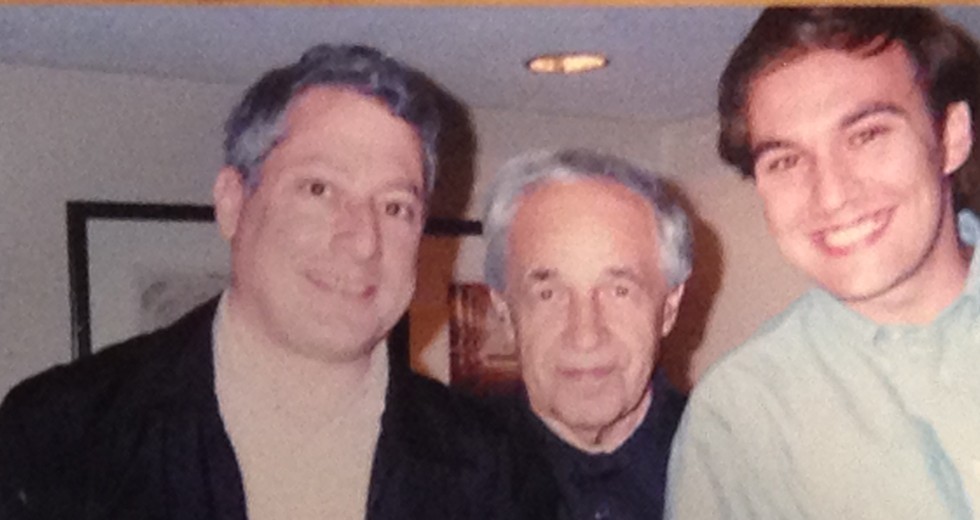
Andrew Patner shared, and Andrew Patner connected, and Andrew Patner mentored. With the tragic news of the Chicago arts critic’s death today at age 55, it’s important to recognize that he shared his passions, he connected with people and connected them to each other, and he was a mentor to young journalists. Those words have taken on somewhat disagreeable meanings in recent years, with people “over-sharing” on Facebook, the word “connect” meaning simply to “meet,” and “mentoring” sometimes appearing to gratify the mentor as much as assist the mentee. But this was never the case with Andrew, who approached them each with generosity and the honest desire to improve the person on the other side of the table, or the recipient of the email. When news of his death today reached me, the world seemed smaller and quieter without this arts critic in it, likely because he lived so far beyond the implications of “arts critic.”
I met Andrew in the spring of 2000 at Carnegie Hall. The Chicago Symphony Orchestra and Daniel Barenboim were playing a concert as part of a tour, and I was in New York City to audition for the master’s program in trumpet at Juilliard. The concert was sold out, and I arrived at 6 p.m., two hours before the concert to buy a returned ticket. By 7:45, about three tickets had been returned, and I was still in line. Then I saw a man walk through the lobby doors. He looked at the line, looked at me, and asked, “Do you need a ticket?” I accepted the offer of his second ticket, and we immediately found a great deal in common and kept in touch after I moved to Bloomington to attend Indiana University, first for trumpet, and then musicology.
Chicago was Andrew’s home, and he loved it, its history, its lake, its restaurants, its architecture, its institutions. He respected all of its citizens, and wanted an arts community that was worthy of them. At the same time, he was as cosmopolitan a person and as knowledgeable about the world as can be imagined. He could tell a person more about the town down the road, as well as the other side of the world. When I was in Bloomington, he made sure I knew about the surprisingly progressive architecture of nearby Columbus, Ind., and its connection to Chicago, the architect Harry Weese. Before I traveled to Vienna several years ago, we sat at his kitchen table and mapped out (on an actual map, this being before Google Maps) the points I needed to visit.
Andrew was an arts critic, but he was rarely the mean-spirited, scolding caricature of a critic that most people envision, and certainly not that way in recent years. He was an advocate for artistic mastery and for the public display of deep study, whether it be a violinist’s bowing, a conductor’s interpretation, or of the form a composer employed in a contemporary piece of music. He also had a gift for conveying appreciation for each of those, a descriptive skill that every critic will tell you is infinitely more difficult than mercilessly criticizing a performance. (If you want to test this theory, think of your favorite movie and then say why it’s your favorite in 10 different ways.)
Andrew also seemed to know everybody, and loved to communicate with them. Before everyone had their personal Facebook wall for sharing news big and small, Andrew had his own network for emailing news articles on every conceivable topic: politics, music, theater, film, on and on. They were always signed “aP,” and we jokingly referred to these emails as The aP Newswire. Long email exchanges often resulted, and when Andrew joined Facebook, that conversation migrated and took on epic lengths there among his thousands of friends and acquaintances. He was one of those rare people whose written words were as entertaining and insightful as their conversation.
Andrew was an invaluable mentor when I decided to become a journalist. He put me in touch with several writers and editors who helped me become a professional writer, and introduced me to several musicians and publicists (to further help me make introductions to those musicians). I joined the staff of Time Out Chicago in 2005, after Andrew helped get me an interview for the position. If anything I wrote was shaded a little too much, or sounded too vague, I could be sure to have a message about it from Andrew. This wasn’t to criticize me, it was because he viewed journalism as valuable, and the arts as valuable, and if someone was going to claim a right to comment on the arts, it had better be accurate. Others have said similar things today.
Taking one person with one interest, and putting them in touch with another with a similar concern was one of Andrew’s seemingly preternatural skills. His range of acquaintances was so vast, across so many countries, that many of us found ourselves with new friends we’d never have discovered otherwise. Andrew’s gift was never to want to keep his friends to himself; rather, like a love of a particular book, he wanted you to have them as your friends, too. And you were worth their friendship, too. When Andrew was in Chicago, his friends were never alone.
Marc Geelhoed is the CSO’s manager for audio media.
PHOTO: Andrew Patner (from left), CSO conductor emeritus Pierre Boulez, Marc Geelhoed. Backstage of Orchestra Hall in 2001.